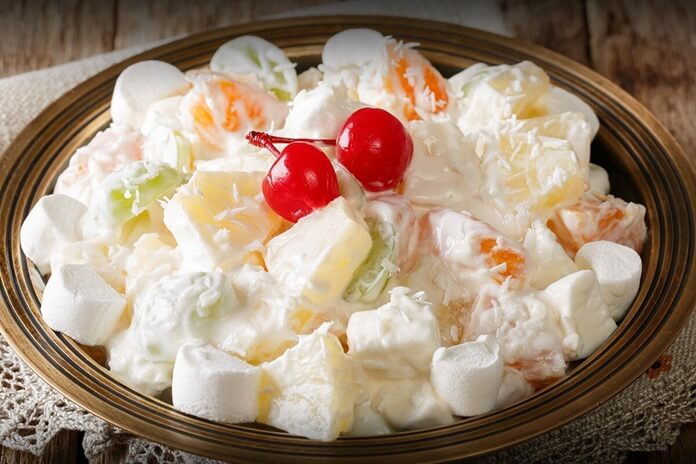National Ambrosia Day is celebrated every year on December 12. This day honors “ambrosia,” a food from Greek mythology known as the “food of the gods.” The Greeks believed that eating ambrosia would make a person immortal. Nowadays, ambrosia is usually served as a dessert or side dish. It’s a creamy fruit salad made with various fruits of your choice. Though it’s not a regular dish for most people, it’s enjoyed on special occasions and is thankfully healthy too! National Ambrosia Day is a fun day for anyone who loves food, especially those who enjoy healthy treats.
History of National Ambrosia Day
The origins of National Ambrosia Day go back to the late 1800s when the recipe for ambrosia first appeared in cookbooks. During this time, citrus fruits became widely accessible, making the simple recipe possible.
It was made with orange slices and coconut sprinkled with sugar and served in a glass bowl. In the U.S., ambrosia became popular among Southern Americans in the 19th century, though the recipe didn’t appear in print until 1932.
Today, ambrosia is often made with pineapples, oranges, or mandarin oranges, coated with sugar and coconut. Some people add marshmallows and jelly beans for extra flavor, and it’s common to find pecans and other nuts in the mix.

The creamy texture is achieved using yogurt, sour cream, or whipped cream. After mixing, the salad is usually refrigerated for a few hours or overnight to get the perfect texture. However, traditional ambrosia is made with freshly cut fruits and served immediately.
Traditional recipes in the South may include bananas, cherries, raisins, nuts, and grapefruits. While ambrosia is a simple dish, its rich creaminess can make it hard to decide if it should be served as a dessert or a side dish. It’s full of vitamin C, and the recipe can be easily adjusted to fit different tastes.
| 1200 B.C. (Earliest Citrus Fruits) | The earliest citrus fruit seeds are recovered from Cyprus, which has a reputation for excellent oranges. |
| 310 B.C. (First Writings about Citrons) | The earliest complete description of the citron is attested from Theophrastus. |
| Early 19th Century (Modern Marshmallows) | Confectioners in France pioneer the recipe for the modern marshmallows, which is a part of ambrosia if so desired. |
| 1861 (Jellybeans Soldiering On) | Boston confectioner William Schrafft sends his jelly beans to soldiers during the American Civil War. |
5 Interesting Facts About Oranges
- Christopher Columbus’s Citrus Contribution: Christopher Columbus didn’t just discover America—he also introduced citrus fruits like sour oranges, sweet oranges, citron, lemon, lime, and pomelo to Haiti in 1493.
- America’s Love for Orange Juice: In 2018, the average American consumed nearly six gallons of orange juice, showcasing the nation’s love for this refreshing drink.
- A World of Oranges: There are over 600 different varieties of oranges worldwide, highlighting the incredible diversity of this popular fruit.
- Citrus for Stress Relief: Citrus peels contain an essential oil called linalool, which has natural stress-relieving properties, making oranges more than just a tasty treat.
- Natural Cat Repellent: Orange juice and peels can double as cat repellents. Cats dislike the smell of citrus, so placing orange peels or pulp in certain areas can help keep them away.
Conclusion
In conclusion, National Ambrosia Day is a delightful celebration of a dish steeped in both mythological and culinary history. What began as the “food of the gods” in Greek mythology has evolved into a beloved dessert that continues to grace tables, particularly in the Southern United States.
Whether enjoyed as a side dish or a sweet treat, ambrosia’s versatility and health benefits make it a cherished part of American food culture. As December 12 approaches, it’s the perfect time to indulge in this creamy, fruit-filled delight, appreciating its rich history and the simple pleasure it brings to special occasions.
Frequently Ask Question
1. What is National Ambrosia Day?
National Ambrosia Day is celebrated every year on December 12 to honor the dish known as ambrosia, which has roots in Greek mythology as the “food of the gods.” Today, ambrosia is typically enjoyed as a fruit salad or dessert.
2. What is ambrosia?
Ambrosia is a creamy fruit salad made with a variety of fruits such as pineapples, oranges, or mandarin oranges. It often includes ingredients like coconut, sugar, yogurt, sour cream, or whipped cream. Some recipes also add marshmallows, jelly beans, or nuts for extra flavor.
3. What are the origins of ambrosia?
Ambrosia’s origins date back to the late 1800s when its recipe first appeared in cookbooks. The dish became particularly popular in the Southern United States during the 19th century.
4. How is traditional ambrosia different from modern versions?
Traditional ambrosia was made with orange slices and coconut sprinkled with sugar and served immediately after preparation. Modern versions often include additional fruits, nuts, and other ingredients, and the salad is typically refrigerated for a few hours or overnight to enhance its texture.
5. Can ambrosia be served as a dessert or a side dish?
Ambrosia is versatile and can be served as either a dessert or a side dish, depending on personal preference and the occasion.
You may also like to read, National Gingerbread Cookie Day – November 21, 2024
